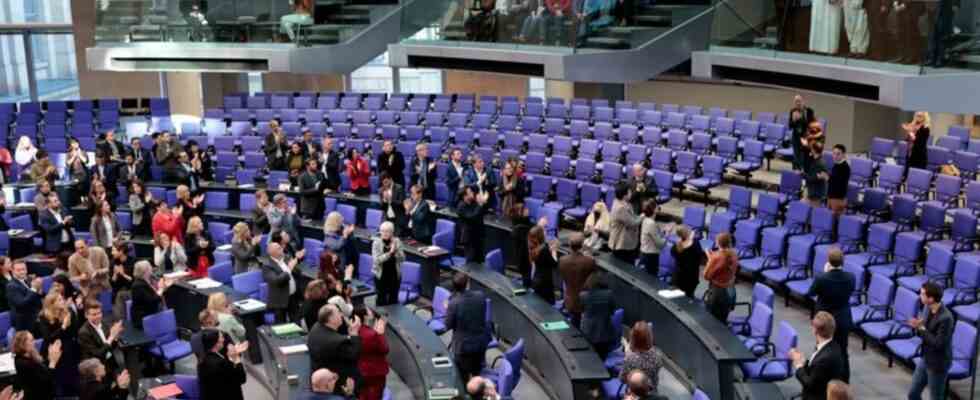human rights
Bundestag recognizes crimes against Yazidis as genocide
The motion to recognize the crimes against the Yazidis as genocide was unanimously approved. photo
© Carsten Koall/dpa
They were enslaved, mistreated and killed by the thousands: Yazidis. Germany sees itself as having a special responsibility for the community. The investigation of the deeds should continue.
A few years after the massacres of the Yazidis by the terrorist militia Islamic State (IS), the Bundestag recognized the crimes as genocide. A motion to this effect by the traffic light coalition and the opposition Union faction was unanimously approved in Berlin.
More than 5,000 members of the Yezidi religious community were murdered by IS in 2014. The terrorist militia aimed to annihilate the minority living primarily in the northern Iraqi Sinjar region. Tens of thousands of people were killed, abducted, enslaved and mistreated.
“The German Bundestag bows to the victims of the war crimes and crimes against humanity committed by IS,” said the Bundestag resolution. “It must become one of Germany’s tasks as a whole to raise public awareness of and commemorate the genocide of the Yazidis.” The processing must be further supported.
Largest Yazidi diaspora worldwide
As the Bundestag further stated, the largest Yazidi diaspora in the world lives in Germany. “The important thing is their life in self-determination.” The diaspora is part of German society. The Bundestag will work emphatically to protect Yazidi life in Germany.
Parliament also agreed that the perpetrators would continue to be prosecuted under the International Criminal Code. Responsibility for this also derives from the fact that since 2012 more than 1,050 Germans have traveled to the areas occupied by IS to fight for the terrorist organization. Judgments against perpetrators under the German Code of Crimes against International Law, such as in November 2021 in Frankfurt am Main or in July 2022 in Hamburg, have already attracted worldwide attention.
Baerbock: “Why didn’t we act?”
Foreign Minister Annalena Baerbock (Greens) said with a view to the massacre that the question must also be asked in the future: “Why didn’t we act?” This is how it became known at the time via GPS data sent, when thousands of women were penned up in a school by their tormentors. “Didn’t we act based on the origin of the victims or the sex of the victims?” You can’t answer that question, Baerbock said.
It is all the more important that people who are still missing are searched for and that the crimes are further clarified, said Baerbock. “As a society, it is our duty (…) to ensure that we not only recognize, but that we create justice for the victims.” According to the judgments available, it is important that the crimes are further processed by the International Criminal Court. “We can ensure that the victims receive justice so that the genocide is not inherited.”
CDU MP speaks of barbaric criminals
CDU MP Michael Brand said: “There must be no corner of the earth for these barbaric criminals where they are safe from punishment.” Germany, with its largest Yazidi diaspora, has a great responsibility here.
SPD deputy Frank Schwabe said it was necessary to examine whether people who cannot stay in Iraq could be admitted. However, work must also be done to ensure that those affected return to their usual places.
Greens: Sinjar region must be pacified
“The Sinjar region is now crushed, crushed between military operations by Turkey and Iran, between the autonomous government in the north and the central government in Baghdad,” said Green MP Max Lucks. The pacification of the region must become the focus of German Iraq policy. The IS terrorist militia has now been defeated militarily, but IS cells are still active in Iraq and Syria.
Lucks called for more humanitarian aid for genocide survivors. FDP MP Christoph Hoffmann warned: “Many Yazidis are still stuck in the UN camps in northern Iraq.”
An initiative by Baden-Württemberg, after which 1,100 vulnerable Yazidi women and children were admitted to a special contingent, was praised several times during the debate. Psychological and medical support was also made possible.
Iraq’s President Abdul Latif Raschid welcomed the Bundestag’s decision. The Kurdish politician wrote on Twitter that what happened to the Yazidi people at the hands of IS terrorists should be regarded as genocide.
The chairman of the Central Council of Yazidis spoke of “satisfaction”. Irfan Ortac told Bayern 2 that he now hopes to create a documentation center about the persecution of the Yazidis and a memorial for the people.

